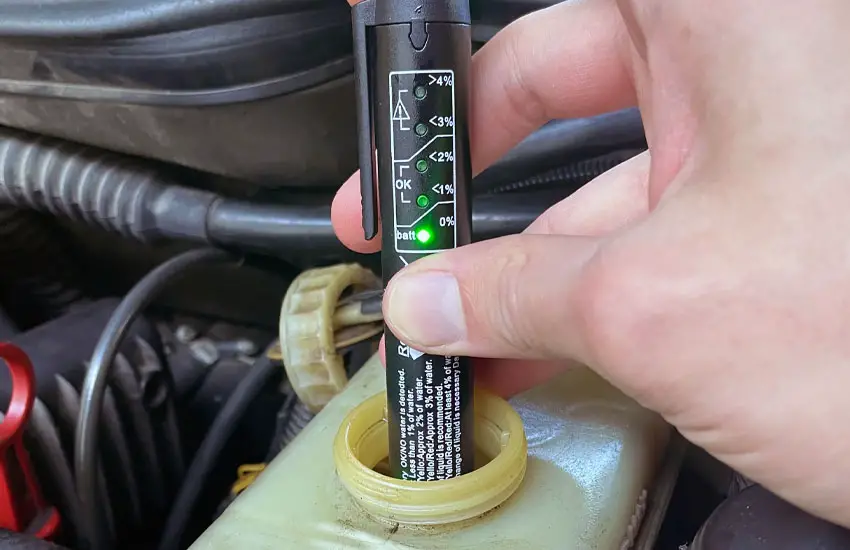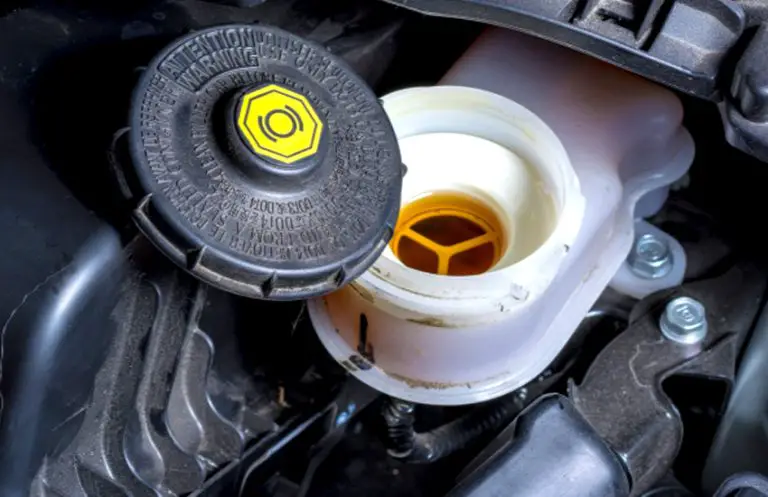You’ve probably heard about brake fluid testers and wondered if they really give accurate results. After all, keeping your brakes in top condition is super important for your safety. But how do you know if the tool you’re using is trustworthy? In this post, we’ll dive into whether brake fluid testers do what they claim and how reliable they actually are. We’ll also talk about the different types of testers out there and what you should look for when choosing one. Let’s get into it so you can make sure your brake fluid is always in check!

Do Brake Fluid Testers Work, or Are They Just Gadgets?
What Is a Brake Fluid Tester and How Does It Work?
Brake fluid testers are handheld devices designed to measure the moisture content in your car’s brake fluid. Why is this important? Over time, brake fluid absorbs moisture from the air, reducing its effectiveness and potentially leading to brake failure. These testers typically work by using electrical conductivity to assess moisture levels, giving you a quick reading on whether it’s time to replace the fluid.
When I first got my hands on a brake fluid tester, I was skeptical. I mean, how can a pen-like device give such vital information? But the science behind it is sound. Brake fluid is hygroscopic, meaning it absorbs water. As the water content increases, so does the fluid’s conductivity. The tester picks up on this change and provides a reading—often with LED lights indicating safety levels.
Sounds simple, right? But here’s the catch: Not all testers are created equal. Some use high-quality sensors and precise electronics, while others are less reliable knockoffs. In my experience, investing in a reputable brand like OTC or Neiko can make all the difference. Cheap testers might show inconsistent results, making you doubt their accuracy.
Do They Provide Accurate Results Every Time?
The short answer: It depends.
High-quality brake fluid testers are surprisingly accurate when used correctly. I’ve tested multiple vehicles with both a tester and professional lab analysis to compare results. For testers from trusted brands, the readings were within a small margin of error—usually accurate enough for DIY car maintenance.
But here’s the thing: Proper usage is key. If you don’t clean the probe before testing or fail to follow the instructions, your results might be off. For example, testing fluid straight from the reservoir without letting the probe acclimate can cause inaccurate readings. And if the fluid has been sitting in a contaminated system, the tester might not give a full picture of its condition.
Additionally, testers are limited to measuring moisture. They won’t detect contamination from dirt, rust, or other debris, which also affects fluid quality. For that, you’d need a more comprehensive analysis.
My Experience with Brake Fluid Testers
When I first tried a tester, I was skeptical, as I mentioned earlier. I decided to experiment with my car, my neighbor’s truck, and my best friend’s older sedan. After using the tester, I compared the results with a professional mechanic’s diagnosis. On two vehicles, the tester matched the mechanic’s assessment: one needed a fluid change, and the other was fine. However, on the third car, the tester read “OK,” while the mechanic flagged the fluid as slightly contaminated.
This highlighted the testers’ limitation: they’re great for moisture but not a full diagnostic tool. Still, they’re a fantastic first step for routine checks.
When Should You Use a Brake Fluid Tester?
Why Testing Regularly Matters
Brake fluid isn’t something most of us think about daily, but it’s one of your car’s unsung heroes. It transfers the force from your brake pedal to the brake pads, allowing you to stop your vehicle safely. However, as it absorbs moisture, its boiling point lowers, increasing the risk of brake failure, especially during hard braking or in hot conditions.
So, how often should you test? Most experts recommend checking your brake fluid every six months, especially if you live in a humid climate. I’d suggest keeping a tester handy if you frequently tow heavy loads or drive in extreme conditions. It’s better to catch early signs of trouble than to wait for a full-blown issue.
How to Use a Brake Fluid Tester Like a Pro
Using a brake fluid tester is simple but requires attention to detail. Here’s a step-by-step guide:
- Clean the Probe: Always start with a clean probe to avoid contaminating the fluid.
- Access the Reservoir: Open the brake fluid reservoir carefully, ensuring no dirt or debris enters.
- Insert the Tester: Dip the tester into the fluid without touching the sides of the reservoir.
- Read the Results: Check the indicator lights or display for the moisture level. Green usually means good, yellow indicates caution, and red signals that it’s time for a fluid change.
One tip I’ve learned: Don’t let the tester sit in the fluid too long, as this can skew results. A quick dip and reading are all you need.
Real-World Scenarios
I recently had a friend complain about a “mushy” brake pedal. He hadn’t checked his brake fluid in years but didn’t want to spend money on a mechanic visit just yet. Using my brake fluid tester, we discovered the moisture level was at 3%—high enough to warrant immediate replacement. This simple test saved him from potential brake failure and costly repairs down the road.
Are Brake Fluid Testers Worth the Investment?
Pros and Cons of Using a Tester
Let’s weigh the pros and cons of these devices:
Pros:
- Convenience: Quick and easy to use at home.
- Cost-Effective: Saves money compared to frequent mechanic visits.
- Early Detection: Identifies moisture before it becomes a problem.
Cons:
- Limited Scope: Doesn’t detect dirt, rust, or other contaminants.
- Potential for Error: Inconsistent results if used improperly.
- Quality Variance: Not all testers are reliable.
From my perspective, the benefits far outweigh the drawbacks. A tester isn’t a replacement for professional maintenance but serves as a handy tool for regular checks.
How to Choose the Right Tester
When shopping for a brake fluid tester, look for features like:
- Accuracy: Check reviews and opt for a trusted brand.
- Ease of Use: Simple, intuitive designs are best for beginners.
- Durability: A tester should withstand regular use.
Personally, I recommend testers with clear LED indicators and robust build quality. My go-to device cost under $30 but has proven reliable over several years.
Are There Alternatives?
If you don’t want to use a tester, you can rely on visual inspection or a boiling point test. However, these methods are less precise and often require more effort or equipment. A brake fluid tester is arguably the most user-friendly option for most car owners.
I hope this helps you eliminate those pesky water spots—or in this case, moisture spots in your brake fluid! Brake fluid testers are an invaluable tool for monitoring your car’s health. While they’re not perfect, they provide accurate enough results for most DIY maintenance. Just remember to pair them with regular professional checks for the best results.
Are These Questions in Your Mind?
Is it safe to rely solely on a brake fluid tester?
No, while testers are reliable for moisture detection, they can’t identify other contaminants. Regular professional checks are essential.
Can brake fluid testers detect all types of contamination?
No, they only measure moisture content, not dirt, rust, or oil contamination.
Do I need to replace the fluid if the tester shows high moisture?
Yes, high moisture levels reduce brake fluid effectiveness and should be addressed immediately.
Is it worth buying a tester if I rarely drive?
Yes, even occasional driving can cause moisture buildup over time.
Can I use the tester on all vehicles?
Most testers work on DOT 3, DOT 4, and DOT 5.1 fluids, but not DOT 5 (silicone-based fluid).
Do testers work on old brake fluid?
Yes, but results might vary if the fluid is heavily contaminated.
Is there a risk of damaging the fluid reservoir?
Not if you use the tester carefully and avoid touching the reservoir’s sides.
Can brake fluid testers last long?
Yes, with proper care, a quality tester can last several years.
Do I need to calibrate the tester?
Most testers don’t require calibration, but check the manufacturer’s instructions.
Is it better to test or just replace the fluid regularly?
Testing is more cost-effective but should be paired with regular replacements based on your car’s manual.


